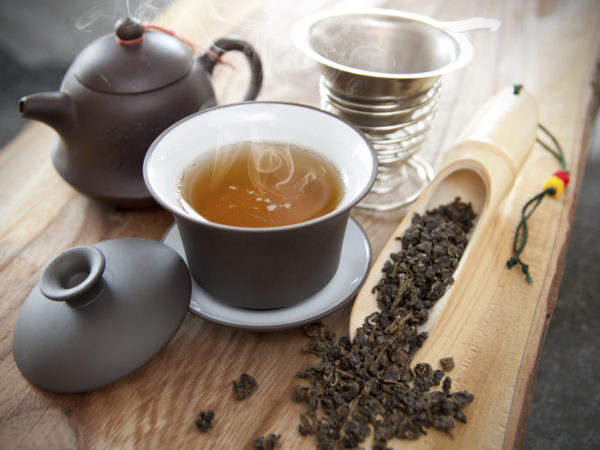Why Drink Oolong Tea?
I’ve heard that that oolong tea can reduce blood sugar and increase fat oxidation. Can you tell me if these claims have any scientific merit?
Andrew Weil, M.D. | February 26, 2013

Oolong tea is what you usually get in Chinese restaurants, but don’t judge oolong on the basis of that tea, which is typically of low quality. The better oolongs are delicious. This type of tea represents an intermediate stage of tea-leaf oxidation between green and black teas. Many people in the United States stick to green or white tea exclusively because they believe those varieties offer the most health benefits, but oolong has similar antioxidant properties. In China, oolong has a mystique and culture as rich as that of green tea in Japan. For the record, the U.S. Department of Agriculture’s research service reports that about 75 percent of the tea produced worldwide is black; about 23 percent is green; and about 2 percent is oolong.
The effect of oolong tea on blood sugar has been tested in several studies. Investigators with the U.S. Agricultural Research Service (ARS) conducted a pilot study in 2001 with eight volunteers, all with type 2 diabetes. They found that by drinking six cups of oolong daily for eight weeks, the volunteers were able to lower their blood sugar levels by 15 to 20 percent. Another study, from Taiwan, published in Diabetes Care in 2003, seemed to show that drinking oolong tea (while also taking drugs to lower blood sugar) significantly lowered blood sugar when compared to drinking water. The researchers concluded that the combination was more effective than the drugs alone. However, since only 20 volunteers took part, the researchers said their results needed to be confirmed in larger studies.
In 2011, ARS researchers published results of a study showing that drinking oolong tea did not improve glucose metabolism in non-diabetic adults. The latest scientific word on the subject comes from a study done in Kyoto, Japan; it confirmed that oolong tea had a positive effect on glucose levels, but it also concluded that long term consumption of oolong may actually be predictive of developing type 2 diabetes. The investigators noted that more research is warranted.
The possibility that oolong tea can boost fat oxidation comes from an investigation of the long-held Chinese belief that this tea can help control body weight. In 2001, ARS researchers tested four different beverages on 12 male volunteers for three consecutive days (during which the volunteers avoided other sources of caffeine). The drinks provided during the study were full-strength tea, colored water with the caffeine equivalent of full-strength tea, half-strength tea, and plain colored water.
The researchers found that the energy expenditure of the volunteers was higher after drinking full-strength tea or caffeinated colored water and that their subjects burned 67 more calories per day when they drank tea instead of an equal amount of plain water. Also, the volunteers’ fat oxidation was 12 percent higher after they drank tea. The investigators said that their findings should be regarded as tentative. I haven’t seen any more recent research showing that drinking oolong tea increases fat oxidation. Tea is an area of great interest for me, and I’ll post updates as studies continue.
Andrew Weil, M.D.










